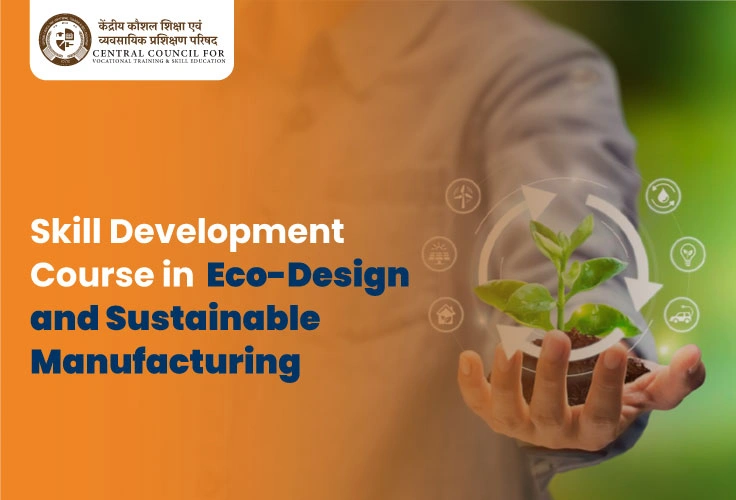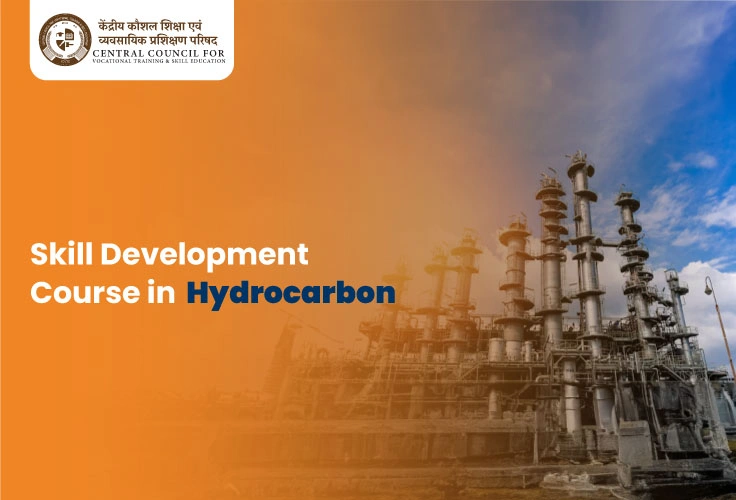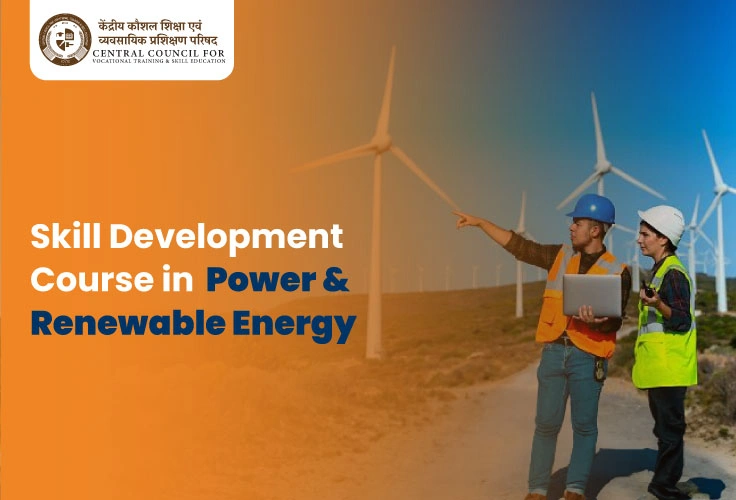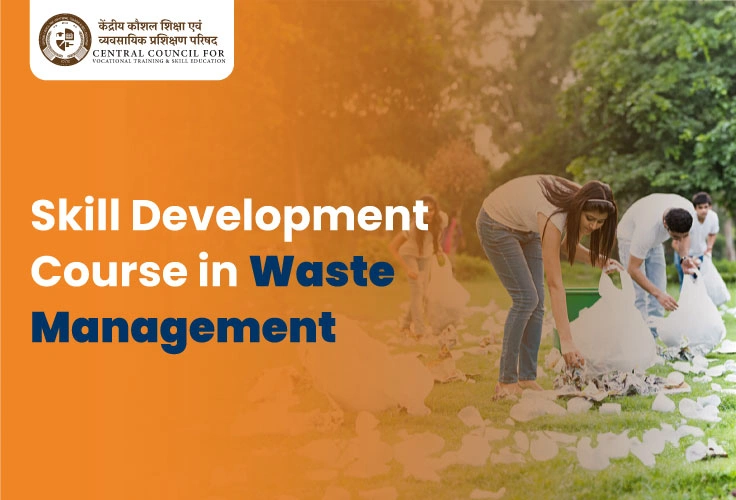- +91 8595350621
- info@ccvte.org
- C4/97B, Keshav Puram, Delhi-110035
Solar Panel Installation
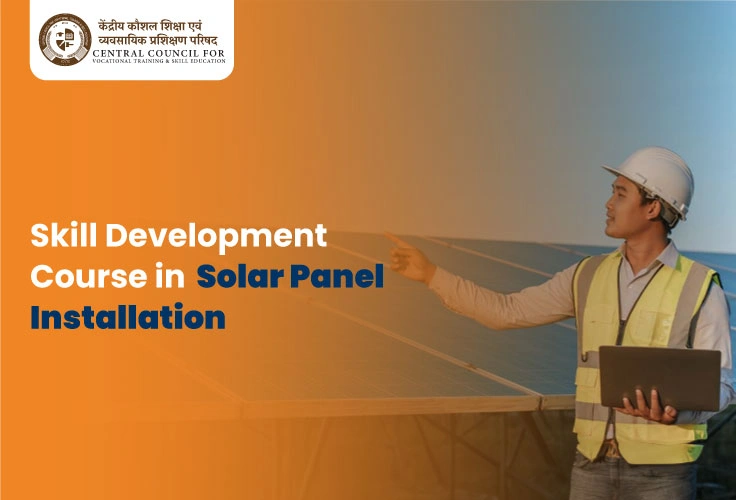
Skill Development Program in Solar Panel Installation
Solar panels, also known as photovoltaic panels, convert sunlight into electrical energy through the photovoltaic effect. Each panel consists of multiple solar cells made from semiconductor materials, typically silicon. When sunlight strikes these cells, it excites electrons, generating a flow of electricity. A solar panel is an apparatus that uses photovoltaic (PV) cells to convert sunlight into electrical power. Typically, solar panels are installed in groups known as arrays or systems. One or more solar panels, an inverter (which changes DC electricity into AC electricity), and occasionally additional parts like controllers, meters, and trackers make up a photovoltaic system. Most panels are found in solar farms, which provide as much energy as possible to the grid.
Why did you choose the Solar Panel Installation Course from CCVTE?
Choosing a Solar Panel Installation course from a CCVTE offers several advantages:
- Industry-Relevant Curriculum: We provide up-to-date and practical knowledge that aligns with current industry standards and demands.
- Expert Instructors: Our courses are typically taught by experienced professionals and researchers who are leaders in the field, ensuring high-quality instruction.
- Hands-On Experience: Our courses offer hands-on projects and real-world case studies, allowing you to apply theoretical knowledge and build a robust portfolio.
- Networking Opportunities: Enrolling in Our courses we can provide networking opportunities with peers, instructors, and industry professionals, which can be valuable for career growth.
- Certification: Upon completion, you often receive a recognized certification or diploma that can enhance your resume and improve job prospects.
- Access to Resources: Our courses usually provide access to a wealth of learning materials, tools, and platforms that can facilitate deeper understanding and practical skills development.
- Career Support: We provide career support services such as job placement assistance, resume reviews, and interview preparation, helping you transition into the workforce more smoothly.
Specializations in Solar Panel Installation :
- Solar PV System Design and Installation
- Solar Energy Economics and Policy
- Solar Energy Storage
- Solar Thermal Systems
- Advanced Photovoltaic Technologies
- Sustainability and Environmental Impact
- Solar Engineering and Technology
- Grid Integration and Smart Grids
- Remote Sensing and GIS Applications in Solar Energy
- Solar Project Management
- Solar Entrepreneurship and Business Development
- Energy Efficiency and Retrofitting
Career Opportunities
- Solar Panel Installer
- Solar Technician
- PV System Designer
- Solar Project Manager
- Renewable Energy Consultant
- Maintenance Technician
- Quality Assurance Inspector for Solar Installations
- Sales Engineer or Sales Representative for Solar Energy Systems
- Field Service Technician for Solar Panels
- Sustainability Coordinator or Energy Manager
- Solar Operations and Maintenance (O&M) Manager
Solar Panel Installation Syllabus
|
3 months |
6 months |
1 year |
2 years |
|
Introduction to Solar Energy and Industry Overview |
Introduction to Solar Energy and Industry Overview |
Introduction to Solar Energy and Industry Overview |
Introduction to Solar Energy and Industry Overview |
|
Solar Photovoltaic (PV) Basics |
Solar Photovoltaic (PV) Basics |
Solar Photovoltaic (PV) Basics |
Solar Photovoltaic (PV) Basics |
|
Solar Panel Design and Sizing |
Solar Panel Design and Sizing |
Solar Panel Design and Sizing |
Solar Panel Design and Sizing |
|
PV Mounting Structures and Installation Tools |
PV Mounting Structures and Installation Tools |
PV Mounting Structures and Installation Tools |
PV Mounting Structures and Installation Tools |
|
Electrical Basics for PV Systems |
Electrical Basics for PV Systems |
Electrical Basics for PV Systems |
|
|
PV System Installation Techniques |
PV System Installation Techniques |
PV System Installation Techniques |
|
|
PV System Commissioning and Performance Evaluation |
PV System Commissioning and Performance Evaluation |
PV System Commissioning and Performance Evaluation |
|
|
Grid-Connected PV Systems |
Grid-Connected PV Systems |
Grid-Connected PV Systems |
|
|
Off-Grid and Hybrid PV Systems |
Off-Grid and Hybrid PV Systems |
||
|
Maintenance and Operation of PV Systems |
Maintenance and Operation of PV Systems |
||
|
Solar Project Management |
Solar Project Management |
||
|
Solar Energy Policy and Economics |
Solar Energy Policy and Economics |
||
|
Advanced PV System Design |
|||
|
Emerging Technologies in Solar Energy |
|||
|
Environmental Impact and Sustainability |
|||
|
Capstone Project and Professional Development |
Top Hiring Companies -
- Palmetto Clean Technology, Inc.
- Bright Solar
- Accurate Powertech India Pvt Ltd
- Adani Solar
- DESIRE ENERGY SOLUTIONS PVT. LTD.
- Loom Solar
- Shri Dhar Renewable Energy Pvt Ltd
- SunPower
- Vikram Solar
- Waaree Energies Limited
- Arin Energy
- Blue Raven Solar
- Goldi Solar
- Momentum Solar
- Sunrun
- Tata Power Solar
- Citizen Solar Private Limited
- CLN Energy
Other Green Jobs Courses Provided by CCVTE
Frequently Asked Questions
Yes, many courses include practical, hands-on training where you will practice installing solar panels and working with solar systems.
Yes, many graduates use their certification/Diploma to start their own businesses, though additional business skills and permits may be required.
It Depends on your Course Duration if you complete a 3 and 6 months course , so you will get a certificate . and if you complete a 1 and 2 years course so you will get a diploma and advanced diploma.
Our course is designed to be highly practical. You will spend more time in workshops and on-site installations, gaining the skills you need to install solar panels efficiently and safely. Theory is important, but we believe that doing is the best way to learn.
Solar Panel Installer, Solar Technician , PV System Designer ,Solar Project Manager , Renewable Energy Consultant , Maintenance Technician ,Quality Assurance Inspector for Solar Installations.

